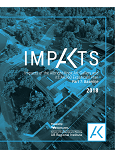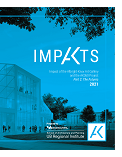Albright-Knox Art Gallery Impact Study
UBRI partnered with the Albright-Knox Art Gallery to conduct a comprehensive two-part economic impact study. Phase 1 identified baseline impacts for the Albright-Knox – one of the oldest art museums in the nation with a world-renowned collection. The study examined how the Albright-Knox contributes to the economy and the community as a tourist destination, employer, business, cultural anchor, innovator and public art partner.
The research quantified direct and secondary impacts on the local, regional and statewide economies. The study also looked at impacts beyond those traditionally measured, such as the museum’s impact on housing prices and taxes. It also explored impacts on innovation through the museum’s Innovation Lab, and the impacts of public art displays on community vitality and quality of life.
Findings were informed by a visitor survey, a public art survey, and interviews with innovation partners. Data generated through this engagement supplemented the collection and analysis of detailed revenue, spending, employment and housing price data.
Phase 2 quantifies how economic impacts are projected to grow as the Albright-Knox implements AK360, an expansion project that will bolster exhibition space, enhance visitor experiences, and more closely integrate the museum within the community.
Economic impact studies conducted by UBRI can help to inform strategic planning, investments, and strategies for growth that yield the largest outcomes and impacts.
UBRI’s baseline study of the Albright-Knox was completed in 2018 and is posted below. Projected impacts (Phase 2) were completed in 2021 and are also included below.


